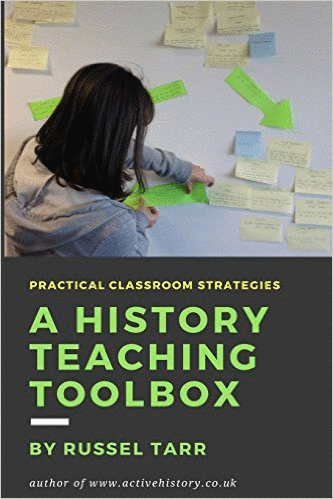Transform your history classroom
ActiveHistory provides educational, award-winning interactive simulations, decision-making games, self-marking quizzes, high-quality worksheets and detailed lesson plans for the school history classroom. All resources have been designed by full-time history teacher Russel Tarr.
An ActiveHistory subscription provides everything you need to construct and deliver a History course from start to finish for the entire 11-18 age range!
These consist not just of lesson plans, worksheets and teacher notes, but also multimedia lectures and interactive games and historical simulations ideal for remote learning and self-study.
World History teaching resources for the high school classroom: lesson plans, worksheets, quizzes and simulation games for KS3, IGCSE, IB and A-Level teachers.
Overview
What are the "History Mysteries"?
The "History Mysteries" lessons are designed as stand-alone projects which each last 3-4 hours.
Through engaging historical topics, they teach skills of problem formulation, deductive reasoning, independent research, groupwork and structured writing.
There is a standard teacher lesson plan and student record sheet / markscheme for each activity.
Also available is a complete case study of the "Iceman Mystery", with all the resources needed to run the History Mystery with your class!
How do they work?
- Students are presented with a "starter image" and a brief roleplay - neither of which comes with any explanation.
- Based on these, the class then comes up with a series of preliminary questions for investigation (e.g. "Who is this?", "Why did they...?", "When did...?", "What is...?")
- The students are then presented with more images to help formulate fresh questions, amend existing ones or even forming provisional answers.
- This question formulation / resolution process then continues with a series of information slips shared amongst the class in groups.
- Finally, the class settles upon the most important questions to investigate and each student produces a written report which is graded against a standardised markscheme.
- Specific credit is given to students who demonstrate evidence of independent research: to this end, the teacher could construct a QR Treasure Hunt to accompany the exercise which students could complete at breaktimes. Here is an case study of a QR Treasure Hunt for the Franklin Expedition Mystery.
What's the point?
The "History Mysteries" serve a number of very useful purposes:
- They develop important skills of question formulation, deduction, reasoning skills, groupwork and structured writing.
- As "stand alone" projects they are a great way of adding variety into a scheme of work with a minimum of fuss.
- They can be used with any year group and ability range: each investigation automatically expands in scope depending on the questions and research abilities of each student.
- The allow the teacher to cover interesting topics which don't otherwise neatly "fit" into an existing scheme of work.
- They are (hopefully) good fun!
Topic |
Period |
| The Iceman Murder Mystery | Prehistoric |
| The Murder of Becket | 1100s |
| Cats' Bottoms and the Holy Grail | 1200s |
| The Princes in the Tower | 1400s |
| The Gunpowder Plot | 1600s |
| The Franklin Expedition | 1840s |
| The Causes of the American Civil War | 1860s |
| The Dreadnought Hoax | 1900s |
| The Disappearance of Antoine de St. Exupery | 1900s |
| Operation Mincemeat | 1940s |

© 1998-2025 Russel Tarr, ActiveHistory.co.uk Limited (Reg. 6111680)
1 Torrin Drive, Shrewsbury, Shropshire, SY3 6AW, England
Privacy Policy | Contact






